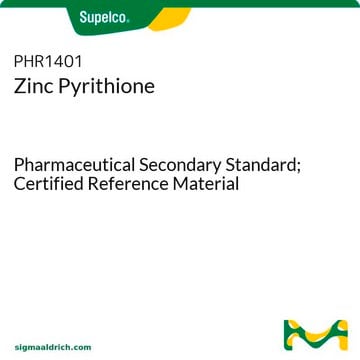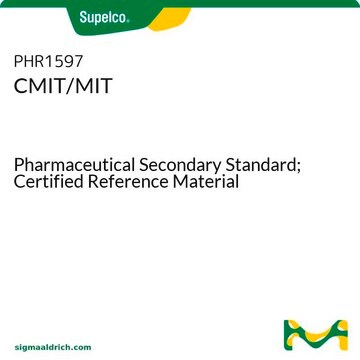134708
2-Bromo-2-nitro-1,3-propanediol
98%
Synonym(s):
BNPD, BNPK, Bronopol
About This Item
Recommended Products
Assay
98%
form
crystals
mp
130-133 °C (lit.)
solubility
H2O: soluble 100 mg/mL, clear, colorless to faintly yellow
SMILES string
OCC(Br)(CO)[N+]([O-])=O
InChI
1S/C3H6BrNO4/c4-3(1-6,2-7)5(8)9/h6-7H,1-2H2
InChI key
LVDKZNITIUWNER-UHFFFAOYSA-N
Looking for similar products? Visit Product Comparison Guide
Application
- Effect of leave-on cosmetic antimicrobial preservatives on healthy skin resident Staphylococcus epidermidis.: This study examines the impact of various antimicrobial preservatives, including 2-Bromo-2-nitro-1,3-propanediol, on the microbiota of healthy skin, particularly focusing on Staphylococcus epidermidis. The findings suggest that such preservatives can influence the skin′s microbial balance, which is essential for maintaining skin health (Zhang et al., 2023).
- Assessing the residual antibacterial activity of clinical materials disinfected with glutaraldehyde, o-phthalaldehyde, hydrogen peroxide or 2-bromo-2-nitro-1,3-propanediol by means of a bacterial toxicity assay.: This research assesses the residual antibacterial effects of various disinfectants, including 2-Bromo-2-nitro-1,3-propanediol, on clinical materials, contributing to improved disinfection protocols in healthcare settings (Lerones et al., 2004).
- Development and testing of a microbiological assay to detect residual effects of disinfectant on hard surfaces.: This study developed a microbiological assay to evaluate the residual effects of disinfectants, including 2-Bromo-2-nitro-1,3-propanediol, on hard surfaces, aiming to enhance surface disinfection strategies in various industries (Mariscal et al., 1999).
Disclaimer
Signal Word
Danger
Hazard Statements
Precautionary Statements
Hazard Classifications
Acute Tox. 4 Dermal - Acute Tox. 4 Oral - Aquatic Acute 1 - Aquatic Chronic 1 - Eye Dam. 1 - Skin Irrit. 2 - STOT SE 3
Target Organs
Respiratory system
Storage Class Code
4.1B - Flammable solid hazardous materials
WGK
WGK 3
Personal Protective Equipment
Certificates of Analysis (COA)
Search for Certificates of Analysis (COA) by entering the products Lot/Batch Number. Lot and Batch Numbers can be found on a product’s label following the words ‘Lot’ or ‘Batch’.
Already Own This Product?
Find documentation for the products that you have recently purchased in the Document Library.
Customers Also Viewed
Our team of scientists has experience in all areas of research including Life Science, Material Science, Chemical Synthesis, Chromatography, Analytical and many others.
Contact Technical Service


![1,8-Diazabicyclo[5.4.0]undec-7-ene 98%](/deepweb/assets/sigmaaldrich/product/structures/120/564/5b373e23-1624-489c-8efb-692de0f96ffb/640/5b373e23-1624-489c-8efb-692de0f96ffb.png)















